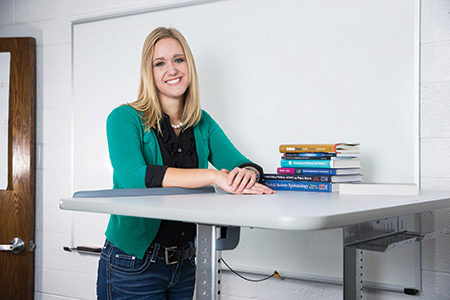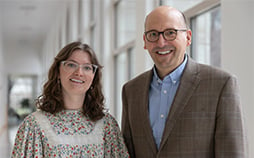Politics, Women, and Cell Phones: Student Research in Tanzania
Learn about student research to improve the socioeconomic status of women in developing countries.
November 2016

Kaylie Carbine, a psychology major in the College of Family, Home, and Social Sciences, learned about undergraduate research grants from Dr. Michael Larson, an assistant professor of psychology. She went on to receive three. She says of Larson, “His lab was the first place I was exposed to cognitive psychology research, and by doing research I was able to find the type of research I am most interested in.”
Recently Carbine was part of a research team that studied the effects of treadmill desks on cognitive performance. In their published findings the team concluded that the health benefits of a walking desk appear to outweigh the slight drop in productivity that comes with such a setup. “We collaborated with individuals in the Exercise Sciences Department,” says Carbine. “They were excited to learn the psychology side of things, and I was interested to learn more about exercise science.”
Carbine is grateful for the professors with whom she worked and for the mentored learning she received as an undergraduate student. “The mentoring I have received has helped me launch innovative research ideas and design projects and carry them through publication - it has prepared me for graduate school.” She is now a graduate student at BYU studying neuropsychology.
Give to BYU
Learn about student research to improve the socioeconomic status of women in developing countries.

When Jamie Easler was a BYU graduate student six years ago, she realized she wanted to better understand youth on the autism spectrum and, by extension, their families.

Ten years have passed since the American Family Survey began collecting data about Americans’ opinions about families—their importance, their health, their needs—and therefore what policies will be most beneficial and popular across party lines.